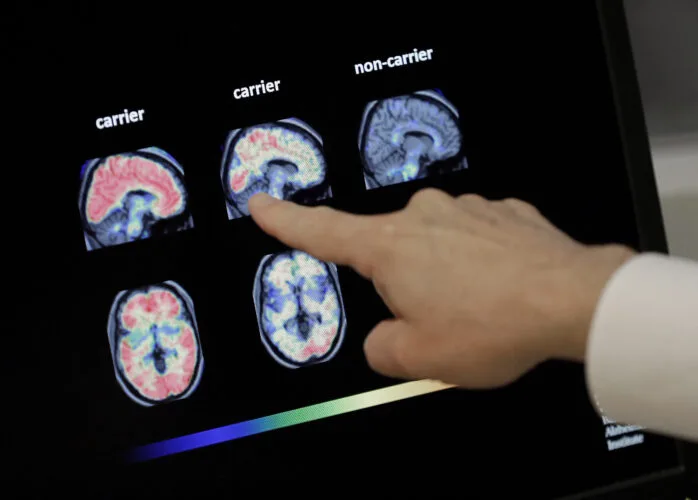
Matt York, Associated Press
In this Aug. 14, 2018 file photo, a doctor looks at PET brain scans in Phoenix.
Researchers at University of Utah Health have identified a gene that may contribute to higher severity of strokes among Black Americans. A version of the PAR4 gene, known as A allele, has been found to potentially be causing the problem.
The research showed mice carrying that version had a higher level of disability after a stroke. They were also less responsive to commonly used drugs that can help to prevent a stroke.
The findings could help develop more effective stroke medications for people carrying the gene.
“This suggests one novel reason for racial disparities in stroke outcomes is that standard anti-platelet therapies may not be appropriate for patients carrying the gene, which includes around 60% of Black patients,” said Robert Campbell, investigator at U of U Health and senior author of the research.
PAR4 works by helping platelets form clots. These clumps of cells are important to help stop bleeding after an injury, but can cause a stroke if they obstruct the flow of blood in the brain.
According to the research, Black Americans have a higher risk of stroke than other ethnic groups, as well as a higher rate of death or disability following a stroke. Although lifestyle and medical conditions contribute to this disparity, past studies also pointed to genetics.
Other studies have shown that platelets from Black patients often attracted significantly more platelets when exposed to the clotting signal compared with platelets from white donors. This finding caused researchers to suspect A allele could be “turbo-charging” the platelets, leading to larger clots and worse stroke outcomes.
The research included looking at data from a large-scale observational study of stroke risk factors in humans. Out of 7,620 Black participants tested for PAR4, it was that individuals carrying two copies of the A allele had a higher incidence of stroke and higher levels of disability afterward.
The scientists turned to mice to dig deeper, which allowed them to control for other genetic and environmental factors, something not possible in humans. This meant they could isolate the effects of just one genetic change.
“It’s all association until you can prove it from a molecular biology perspective,” said Campbell, who is also an assistant professor of internal medicine in the Spencer Fox Eccles School of Medicine at University of Utah.
As predicted, platelets from mice carrying the PAR4 A allele had heightened reactivity. Clots formed larger clusters compared with platelets from mice that were completely identical except for that one gene. Mice with the A allele also had greater disability after a stroke.
Frederik Denorme, the first author on the study and a researcher at U of U Health, said things became really interesting when scientists tested stroke-preventing medications on the mice with the two “humanized” versions of the PAR4 gene.
FDA-approved medications commonly prescribed to prevent stroke, such as aspirin and ticagrelor, protected mice with the PAR4 variant that is common in white people, but did not protect mice carrying the PAR4 variant common in Black people.
Although it’s too soon for the new findings to change clinical practice, Denorme says he hopes the study will impact how clinical research is carried out. Increasing racial diversity in trials can reveal when a drug’s activity varies among groups.
Denorme also said he believes the mouse model may be useful for testing possible new medications to improve stroke outcomes in people.
“These mice will allow us to address questions like why one drug is not good for all stroke patients,” he said. “I think our project hints at the need for personalized medicine based on genetics.”
The research, published in the Journal of Clinical Investigation, was supported by The National Institutes of Health.


